- "Qinyuanchun · Xue" praised the revolutionary heroes of today and expressed Chairman Mao's great ambitions and aspirations
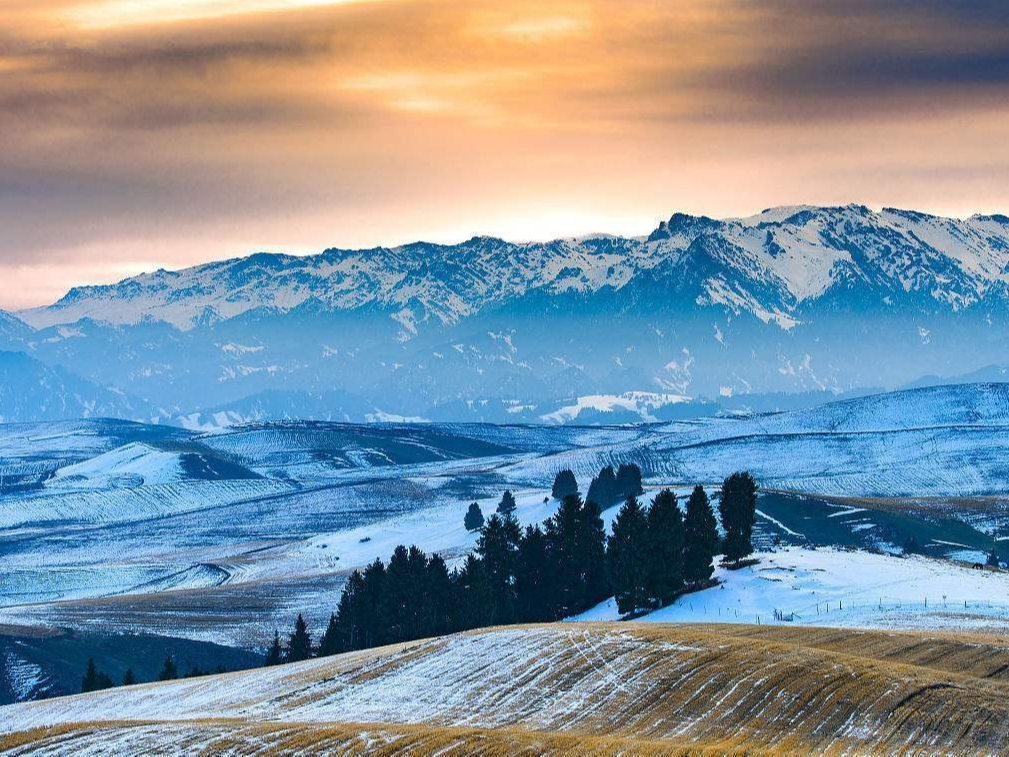
The creation of "Qin Yuan Chun · Xue" has a specific historical background. It originated during the Eastern Expedition, when the Chinese nation changed greatly. Mao Zedong's attempt to create a new historical situation, when full of longing for the future, the advent of a heavy snow triggered Mao Zedong's aesthetic interest, so an ancient masterpiece has appeared since then.
[original]
Qinyuan Spring · Snow
Northland scenery, thousands of miles frozen, thousands of miles of snow drifting.
Looking inside and outside the Great Wall, I was reckless;
Mountain dancing silver snake, the original drive of the elephant, wants to compare with the sky.
You must be sunny, seeing the red dresses, enchanting.
Jiangshan is so many charming, attracting countless heroes.
Xi Qin Emperor Han Wu, slightly lost literary talent;
Emperor Tang Zong and Song Zu were slightly less coquettish.
A generation of arrogance, Genghis Khan, only knows the bow and shoots the big vulture.
Everywhere, count the romantic figures, and look at the present.
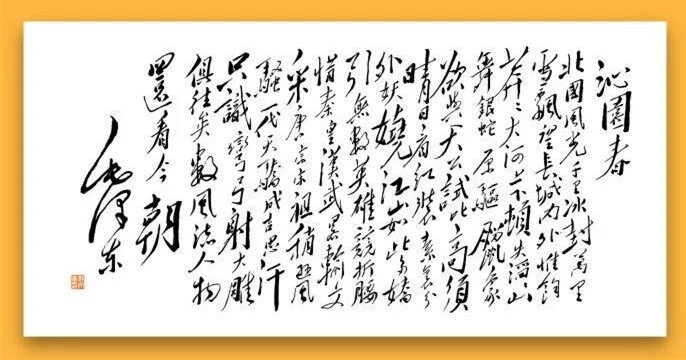
[He Xin translation]
Northern winter scenery, thousands of miles of land frozen, thousands of miles of sky and snow drifting.
Looking far inside and outside the Great Wall, I saw a vast expanse of white; the rapids of the past disappeared up and down the Yellow River.
The mountains are dancing like silver snakes, and the tall pimple is like a giant elephant galloping, and it has to compete with God!
You have to wait for the sunny sunrise and see the red and white sunshine and snow, which is particularly charming and beautiful!
Jiang Shan is so charming, it has attracted countless heroes to bow down!
It ’s a pity that Emperor Qin and Emperor Han Wu lacked the elegance of civilization
Tang Taizong and Song Taizu also had some charms and feelings.
The legendary Genghis Khan, who is not the only god in the world, can only bow and shoot the Eagle Eagle.
It's gone, these past hurrying passengers!
If you want to talk about real romantic heroes, come and see us today!
[New interpretation of He]
(1) History of the Statesman
Mao Zedong's "Qingyuan Spring · Yongxue" is extremely famous and popular. This word is actually a piece of history. And if combined with the political and military background at the time of writing this word, then this is also the work of a sworn teacher.
There are many poems in the Book of Songs. Since ancient times, poems on history have been a big category in Chinese poetry. However, most of the history chanting works are literati chanting history, mostly sad and regretful words. The most famous ones are Su Dongpo's "Going to the East of the Great River", Wang Jinggong's "Guizhixiang", Sadu's "Pengcheng Nostalgia" and so on. Although there is no shortage of strong feelings, the conclusion is nothing more than "life is like a dream, a bottle is still a river" or "looking back at the barren city oblique day and leaning on the column to send Feihong".
However, Mao Zedong's work of chanting history is different from his predecessors. Covering this word is not a literati chanting history, but a chant of history by a great politician, great military strategist, and creator of history. So this word is full of immensely powerful self-confidence that overlooks the eternity and looks to the future.
Mao Zedong himself said that this Qinyuanchun was intended to criticize one aspect of the feudal history of two thousand years. Therefore, the final sentence said: "Go wherever you go, count romantic figures, look at the present!"
The phrase "famous person" comes from Su Dongpo's "Nian Nu Jiao", "Lang Tao has made all the most popular characters". But Mao Zedong did exactly the opposite. Su Dongpo said that "the waves have washed up the romantic figures", but I said "the romantic figures are still looking at the present"-they have just arrived and are just in the ascendant! So who are today's romantic figures? ——It's us!
It was this self-confidence that shocked Mao's main rival, Chiang Kai-shek. It is said that a few years later, when Chiang Kai-shek read the word in Chongqing, he was greatly stimulated and shocked. Although Jiang was the only authoritarian ruler of politics and military on the Chinese stage at that time, he exclaimed that the word was emperor , That Mao Zedong should be emperor.
But destiny is in Sri Lanka, what can Chiang do?
(2) The words of the oathmaster on the eve of the Eastern Expedition
The writing background of this word, according to previous studies: written in February 1936, located on the shore of the Yellow River at the junction of the Qin and Jin Plateaus. In October 1935, Mao Zedong led the Central Red Army Long March to reach northern Shaanxi to establish a base. However, the Shaanxi-Gansu Red Area was a bit sloppy, with a narrow area, and was surrounded by enemy forces of the Central Army, the Northeast Army, and the Northwest Army. From a military point of view, the Red Army was weak at that time, and the barrenness of northern Shaanxi could not support many soldiers. At the end of the year, the Communist Party of China convened a "Wayao Fort Meeting", stating that the northern part of Shaanxi was barren and that it was difficult for people and animals to drink water. It was necessary to develop outward. The development direction is no less than five: east, south, west, north, and middle. Mao Zedong proposed to develop eastward and enter Shanxi to open the Luliang Mountain base. The Politburo agreed with Mao's proposal.
In February 1936, more than 10,000 Red Army anti-Japanese vanguards prepared to cross the Yellow River. Peng Dehuai is the commander and Mao Zedong is a political commissar. This is the first major strategic offensive after the Red Army's Long March arrived in northern Shaanxi.
However, at that time, the senior members of the Communist Party of China were not completely opposed to the Eastern Expedition. Peng Dehuai wrote down his concerns and differences with Mao Zedong before crossing the river in the Readme. He believes that the fatigue of the Long March has not recovered, and the Red Army has only 13,000 people. He was worried that crossing the river would be frustrated. He also worried that after the troops crossed the river, the Central Army of the Kuomintang would quickly enter the Jin Dynasty, besiege the Red Army, and the Red Army would again fall into a situation of baseless operation.
Therefore, based on the painful lessons of the Long March, Peng Dehuai believes that although crossing the river is necessary, it is necessary to retain troops to protect the ferry and ferry, to ensure the connection with the northern Shaanxi base, and to ensure that the Dongdu troops can still withdraw to the northern Shaanxi base when necessary. On the other hand, Mao Zedong advocated fighting backwaters without hesitation after crossing the river. He said, you can absolutely guarantee that I can't guarantee it. There was a fierce argument between the two.
Indeed, for the Red Army, the situation of the Eastern Expedition is still that the enemy is strong and we are weak, and it is a battle of unknown victory or defeat.
On February 7, 1936, Mao Zedong led his army to Yuanjiagou on the banks of the Yellow River in Qinglin, Yulin. He planned to cross the river and enter western Shanxi. It snowed every day. Mao Zedong climbed the route and watched the snow scene.
This word of Mao Zedong is full of high morale and historical self-confidence. It is not a expression of the ancient feelings, but a pride to create history from the beginning. In fact, it is an oath and inspirational words that seek to go north.
However, the goal of establishing the Luliang Mountain Base Area close to North China was not achieved during the Eastern Expedition. It was achieved after the outbreak of the Anti-Japanese War.
(3) Misunderstandings of Yuan Chi's wax figure
In the 1980s, I was doing research work at the Chinese Academy of Social Sciences. I had the attention of the then Politburo member and dean Hu Qiaomu and had contacts with Qiao Gong. Qiao Gong graded my words many times and called from time to time. Once in the winter of 1990, Joe called me to my home, talked and gave me dinner.
Because of Qiao Gongshan's poems, I present some notes on the interpretation of Tang and Song poems written at that time, and two of them are the interpretation of Qiao Gong's. After reading it, Qiao Gong didn't take it seriously and said, "My words are bad. Why don't you write Mao Zedong's poems? That is the most spectacular of ancient and modern poems."
I said that I didn't have enough skill, and I hadn't understood some moods. For example, "Qin Yuan Chun" says "Mountain Dance Silver Snake, the original Chi wax figure", and "the desire is higher than the test of heaven". The mountain can be higher than the sky and makes sense. But "Yuanchi wax figure", the snowdrifts in the wilderness and plains are likened to the elephants of Mercedes-Benz, which is a bit different, and how can a small snowdrift compare with the sky test? Too much exaggeration. ——At that time, I was young and frivolous, and I didn't cover it.
But Qiao Gongwen laughed and said, "You haven't been to northern Shaanxi, have you? The people in northern Shaanxi are not talking about the plains, but the plateaus, or thenext to the soil." After I returned, I checked Shuo Wen Jie Zi and Kangxi Dictionary, and there were no slang words, but I knew that there was no such word in ancient times.
And check the "Modern Chinese Dictionary" to find the word: the highlands formed by scouring in the Loess Plateau in northwestern China, are platform-shaped, the sides are steep, and the top is flat." It is the word for northern Shaanxi, and later introduced geomorphology, becoming the official name of several landform types on the Loess Plateau. In other words, this 塬 character is a new word for modern geography based on the northern Shaanxi dialect.
Therefore, the original "raw wax figure" of Mao Zedong's "Qin Yuan Chun" is actually not a plain or field, but a pile of loess plateau, that is,this is also "Taiyuan" The origin of the word.
Each tower is towering on the ground, and it looks like a giant elephant after the snow, and one tower is higher than the other, so "the desire is higher than the sky test". This understanding benefited from Qiao Gong, the so-called teacher of the word, can not help but record.
Not only that, if you want to compare it with the test of Heaven, this sentence has a sudden rise in the words of "Qin Yuan Chun". In fact, it has no deep meaning. It is the expression of Mao Zedong's contempt for strong enemies and the contempt of Master.
From July 1 to 5, 1945, six senators of the National Government, Chu Fucheng, Huang Yanpei, Zhang Bojun, Zuo Shunsheng, Leng Yuqiu, and Fu Sinian visited Yan'an. According to Zuo Shunsheng's memoirs, Mao Zedong met with them. He once said to them: "Mr. Jiang always thought that" there is no two days, and the people have no two masters. "I" don't believe in evil "and would like to show him two suns! Try higher "also!
[Note 1] About wax and wax figures
The original wax figure was written in the original manuscripts of Mao Zedong in his handwritten manuscripts. According to Guo Moruo's explanation, the wax elephant is a true wax elephant, a non-vulgar solution of white wax.
In fact, Guo Moruo was right. An ash elephant is an inanimate thing-how can it be driven or run? Zhenla, also a powerful country in the ancient Indo-China Peninsula, is now in Cambodia. Since the Tang Dynasty, it has been a Chinese country. It often pays tribute to the court. The true wax elephant or wax elephant is alive. [What changed the original manuscript of Mao Zedong's manuscript by "the original wax figure" was "Nineteen Poems of Chairman Mao" published by People's Literature Publishing House in July 1959. According to the Prophet Qiang's recall, it was Mao Zedong Secretary Tian Jiaying who reviewed this version and changed the "original wax figure" to "the original wax figure". ]
It is driven by the original text, and the popular version is used as a gallop. "Said the text": "Driving, Ma Chi also." "Guang Ya": "Driving, Ben Ye." Although the meaning of driving and Chi is the same, but the word "driving" is more dynamic than Chi.
(4) The passing of "Qin Yuan Chun"
About the circulation of the word "Qinyuanchun", according to relevant materials, the following are compiled:
On September 6, 1945, when Mao Zedong arrived in Chongqing, he first went to visit the teacher Sun Zhigong, a teacher whom he knew in Changsha. Sun Zhigong once taught in Changsha No. 1 Normal University and is better than calligraphy. When young Mao Zedong was teaching in the primary school attached to the First Division, he had heard a lecture from Sun Zhigong. Mao Zedong later practiced calligraphy hard and formed his own artistic style. In the early days, he benefited from Sun Yigong's influence and guidance.
Mao Zedong came to visit, and Sun Zhigong was very pleased. After greetings, Mao Zedong took out a piece of paper and asked Sun Zhigong to see it: "This is a clumsy word, I drew it myself and sent it to Mr. Mr. See if the word has been improved. In the first division, Mr. Mao taught me the essentials of calligraphy For two decades, I have never dared to forget it. "
Sun Zhigong unrolled the scroll, which was Mao Zedong's handwritten book Qin Yuan Chun · Xue. Sun Zhigong praised: "Ok! Good! Antique but not ancient! It has the essence of the ancients, but it can be made out of your own will. It is not easy to create one by the way, and create it together! You are free in the pen. It's up! "
During Mao Zedong's stay in Chongqing, the second person who read "Qin Yuan Chun · Xue" was his other old friend and poet Liu Yazi.
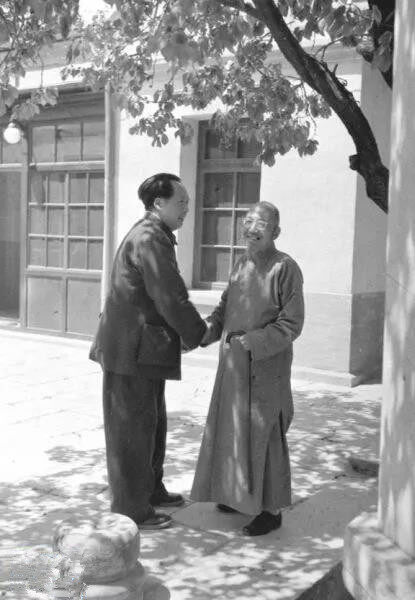
According to the "Chronicle of Mao Zedong": On the afternoon of September 6, Mao Zedong, Zhou Enlai, and Wang Ruofei "visited Liu Yazi and Zhang Boling at Shapingba Nankai Middle School. They presented Liu Yazi with a" Qin Yuan Chun · Xue ".
However, according to a letter Mao Zedong wrote to Liu Yazi on October 7, 1945: "When I first arrived in northern Shaanxi and saw the heavy snow, I filled out a word that seemed to be closer to Mr. Poetry's poem, and it was presented for review." It was October 7th.
Liu Yazi, a well-known figure of the Japanese Nationalist Party, and the elder Yu Youren hosted a banquet to entertain Mao Zedong. Yu Youren and Mao Zedong are both good at poetry and calligraphy. Yu Youren has already read this Qin Yuan Chun · Xue. Yu Youren praised this word very much. He said, "Episode‘ fashionable figures, and look at the present ’.”
Liu Yazi commented on "Qin Yuan Chun": "This is the first time since China has a word. Although Su and Xin still failed to resist, how about Yuzi?"
On October 14, 1945, Mao Zedong's "Qinyuan Spring · Snow" was publicly published in Chongqing's Xinmin Evening News, causing a stir in the cultural and political circles.
Chen Blei, the daring of Chiang Kai-shek, read this word and commented: "The majestic and arrogant mountains and rivers can be called the fine works of the world."
But Chiang Kai-shek said: "I see Mao Zedong's ambitious, want to be the emperor to dominate the king, retro, retrograde. You (Chen Blei) must quickly organize a group of people, write an article to criticize him."
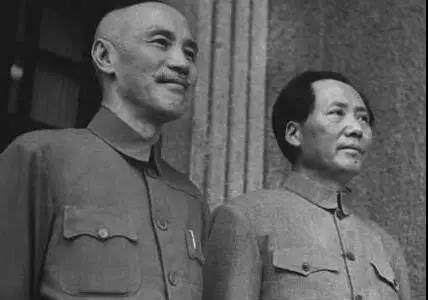
With this call, Jiang sent his pens out of control. So for a time, those celebrities in Chongqing who did n’t know themselves were all doing their best, writing lyrics and singing. According to general statistics, from November 1945 to February 1946, Chongqing newspapers published more than 30 poems including "Qinyuanchun" and Ci, but none of them were vulgar words, low-mindedness, and the ambition of the great man with a mediocre heart. The words are so ugly. So no one can be handed down.
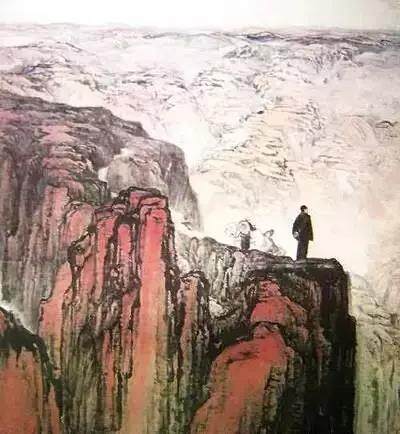
(5) Liu Yazi's peace words
Liu Yazi, the word Yalu, is good at writing old-style poems. Due to Musin's illness, he gave up his illness. In the early years, he devoted himself to following Sun Yat-sen's revolution. He had an old relationship with Mao Zedong in Guangzhou, and he had poetry and singing as a poet friend. After Mao Zedong arrived in Chongqing in October 1945, Liu Yazi presented a poem to Mao Zedong:
The bow of the Cambridge Mausoleum is silent, and the everlasting flowers are very strange.
If Yuntian promises to worry about the country, Guangdong Hainan will unforgettable tea.
Du Duanfang worked for midnight, Jiang Hao Qiu Jin various masters.
Shangshan Zhu Laoxin was able to be healthy, and the white-headed phase was laid.
The so-called "Guangdong tea tasting" in the poem refers to the plot of assassination of Chiang Kai-shek and the launch of a coup by Mao Zedong and Mao Zedong in the Yuehai Tower in Yangcheng in 1926, but this was hindered by Yun Daiying afterwards, but it was fruitless.
Mao Zedong returned to Chongqing with the word "Qinyuanchun" as a reward. After Liu Shi got the words, he wrote a piece of "Qin Yuan Chun" for peace. Word said:
Reunited, a new word, meaning Gongyunpiao.
Sighing plum wine stagnation, Yu Huaiyu;
The Yellow River is turbid and world-wide.
Adjacent to Di Shanyang, Boren is up to me.
Sad, crying Wushuang Guoshi, peerless enchanting.
Talents are beautiful and beautiful, watching elder poets bend back.
Count Huangzhou Taishou, still lose gas;
Jia Xuan is a resident, so he can resolve his complaints.
Huer, Nalan Rongruo,
Engraving with Love
King and me,
To heaven and earth,
Grasp the present.
[Note 2] Introduction of Liu Yazi
Liu Yazi (1887-1958), a native of Suzhou. In the early years, he engaged in the anti-Qing revolution and founded the Nationalist Literature Society Nanshe. In the 1920s, he served as Secretary of Sun Yat-sen's Presidential Office and member of the Central Supervisory Committee of the Chinese Kuomintang. When Mao Zedong was acting minister of the Kuomintang Propaganda Department in Guangzhou and chaired the peasant movement seminar, he had a close relationship with Liu Yazi.
After Chiang Kai-shek launched the "April 12" coup, Liu Yazi was wanted for anti-Chiang and fled to Japan. Returned to China in 1928. During the Anti-Japanese War, he was engaged in anti-Japanese activities with Soong Qingling, He Xiangning, etc., and served as the Central Standing Committee Member and Chairman of the Supervisory Committee of the Chinese Kuomintang Revolutionary Committee, the Central Standing Committee Member of the Three People's Principles Association, and the Central Executive Committee of the China Democratic League. In 1949, he attended the first plenary session of the Chinese People's Political Consultative Conference. After the founding of the PRC, Liu Yazi successively served as a member of the Central People's Government and a member of the Standing Committee of the National People's Congress.
[He Xin translation]
Meet again in twenty years, read your word
Fly with me to the sky
Sorry that the plum was drunk
Leave many puppets
Yellow River Sediment
Flow around
The sound of my neighbor's flute makes me miss my old friend
Boyang died, I'm sorry for those who died
It ’s hard to calm down the anger now
It is sad that those unparalleled scholars in the world!
They are all beautiful and glamorous!
And you are talented
Let all the poets from ancient to modern times bow down in front of you
Compared with you, Su Shi loses his spirit
Xin Jiaxuan's lyric will only complain
Ridiculous Nalanda
Things written by tenderness and honey
Only you and me now--
Can go to the world
Let's seize the moment!
Among the many harmony words sung with Mao Zedong's "Qin Yuan Chun", Liu Yazi is the only one of its kind. However, after all, Liu Yazi is only a literary man, but he has the ambition in the word, but he has to go hand in hand with Mao Zedong and "go to heaven and earth, grasp the present"-it is hard to know the depth, and some are not self-confident!
After the founding of the People's Republic of China, Liu Yazi asked Mao Zedong to allow him to enter the country, but Mao Zedong declined. Frustrated by Liu's request to go back to live in seclusion, Mao Zedong's gift of poetry:
Drinking tea in Guangdong has not forgotten, so sentence Yuzhou Ye Zhenghuang
Thirty-one years old, read Huazhang
Grumble too much to prevent intestinal severance
Mo Dao Kunming pond is shallow, watching fish is better than Fuchun River
——But then again.
"Qin Garden Spring · Snow" uses the northern scenery as an analogy, pinning its expectations for an ideal China, and launching the "romantic people" who created the new China in criticizing its 2000-year history. Throughout Chairman Mao's life, he always thought of the people in his heart, and always wanted to benefit the people. Throughout his life, he has been serving the people wholeheartedly. Author / He Xin Editor / Zhao Yongjing
Comment
 Praise
Praise
 Collect
Collect
 Comment
Comment
 Search
Search



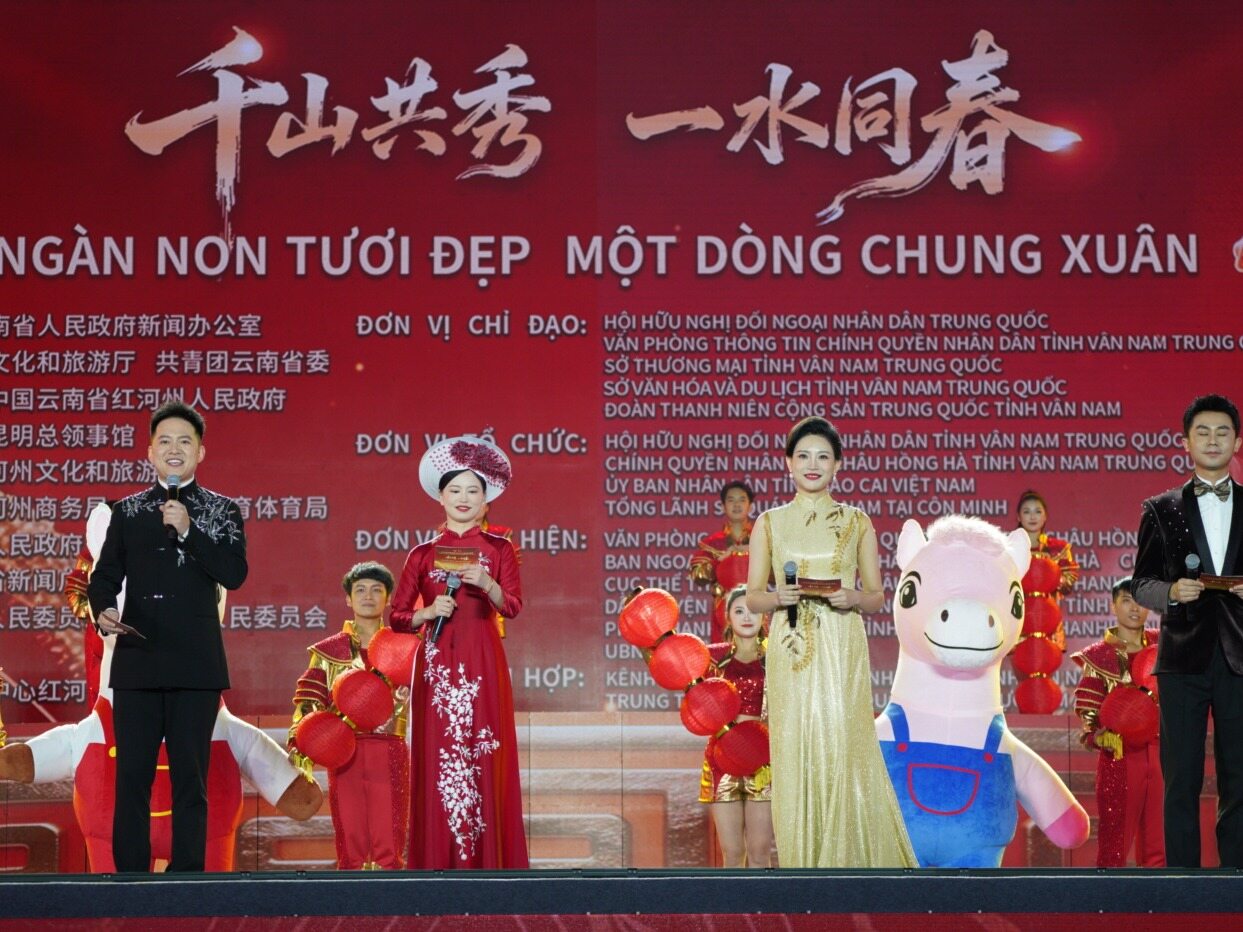
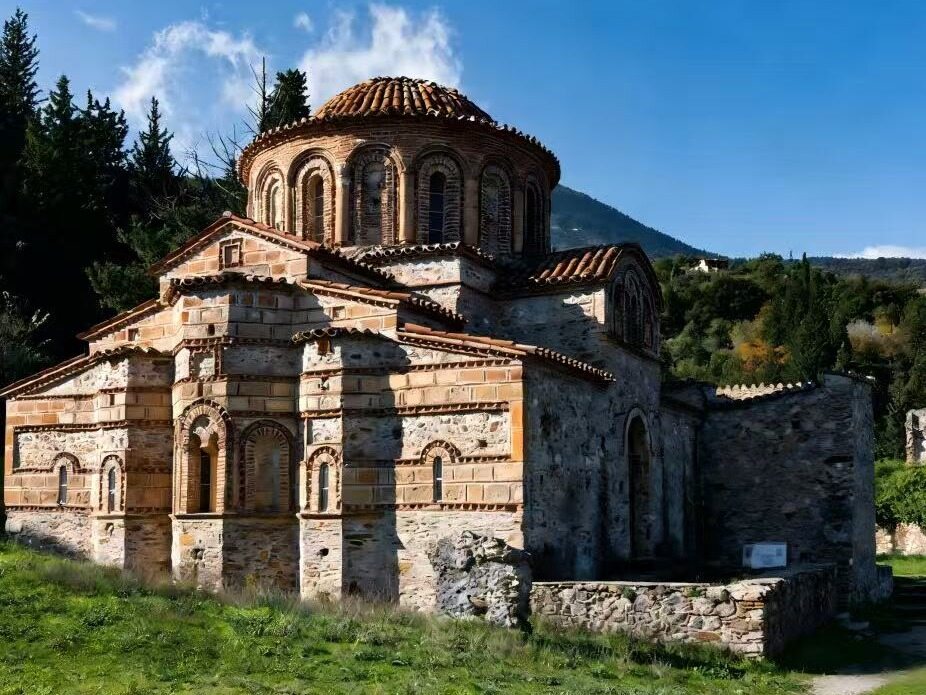
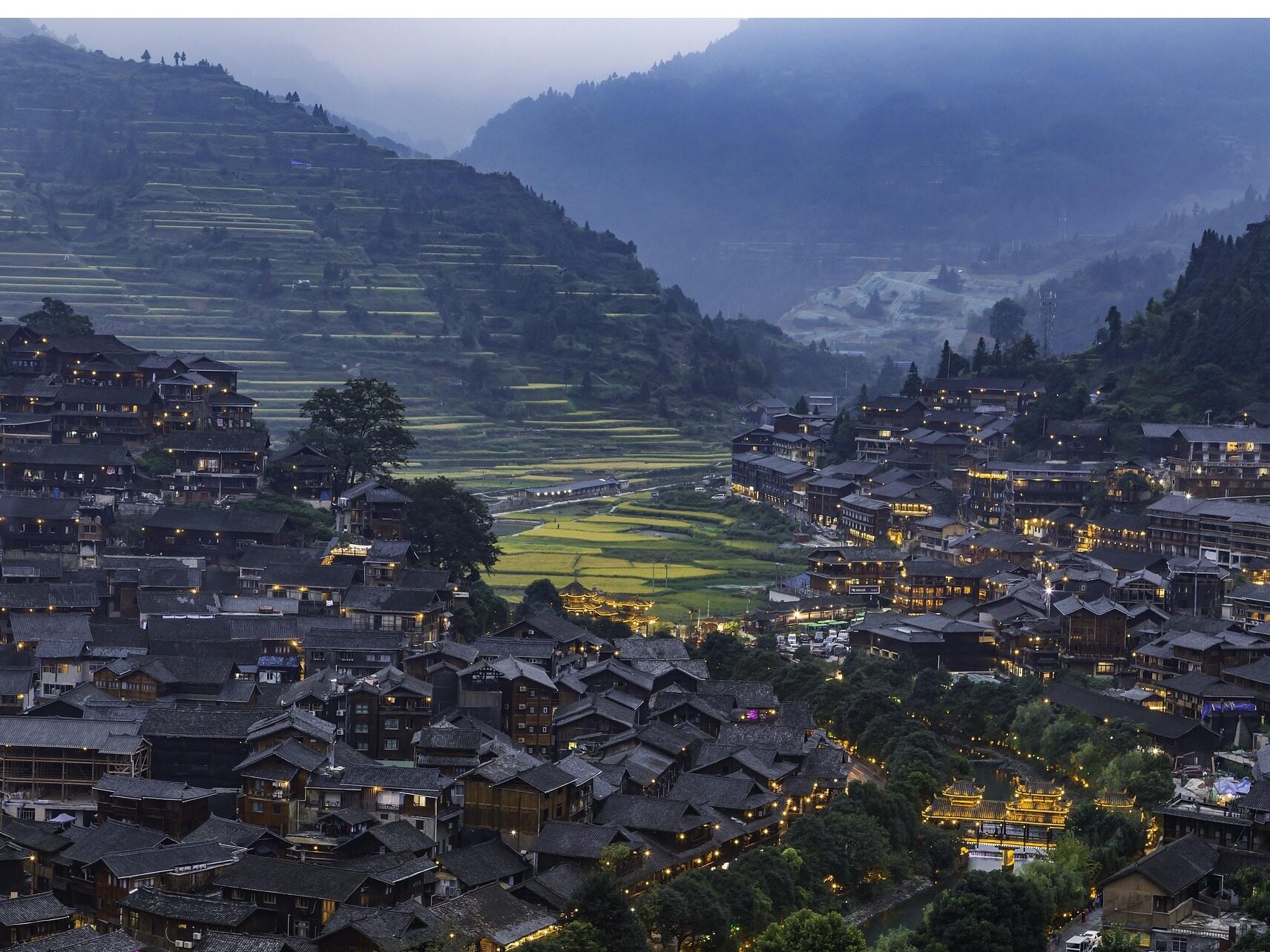
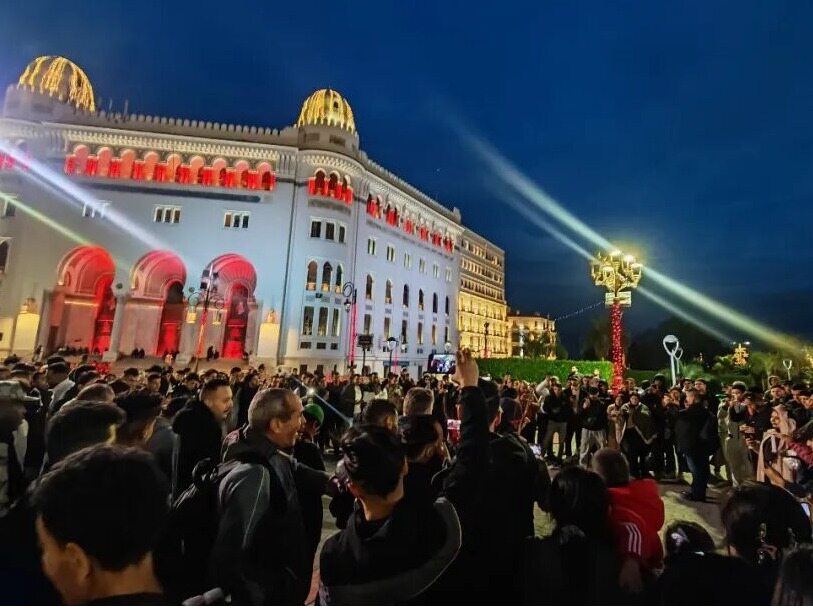
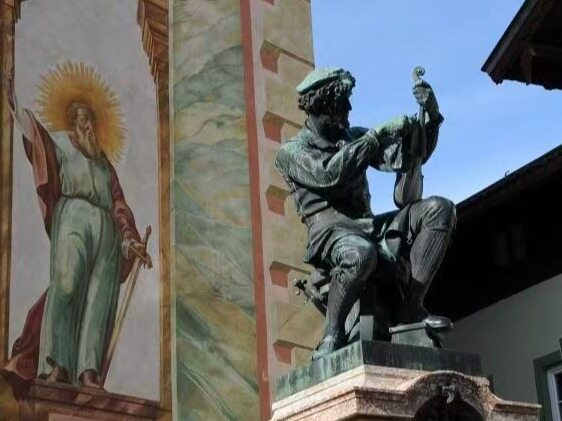






Write something~